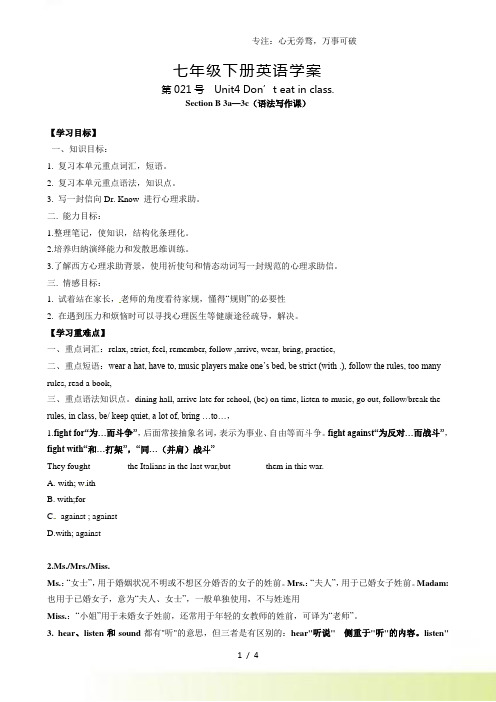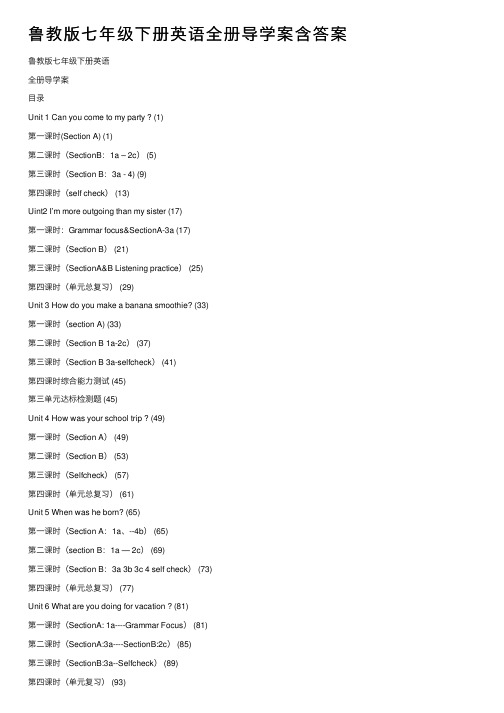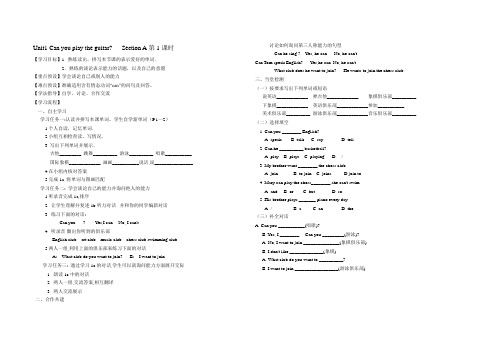七年级英语下册Unit 4 第二课时导学案
人教版七年级英语下册导学案-Unit 4 Don't eat in class

Unit 4 Don’t eat in class .第1课时Section A 新授课导学案【预习指导】一、扫清障碍根据音标读出19到21页的单词,能初步记忆单词。
二、课本预习:熟读课本19 到21页, 划出重要的新短语,新句型。
三、预习效果检查。
1.在外面________2.穿,戴________3.重要的________4.带来________5.校服________6.安静的________7.规则8 。
到达________9.走廊________ 10 。
大厅________ 11.餐厅________ 12.听________ 13. 打架_________ 14.抱歉的,难过的________1.听音乐_________________2.在音乐教室里_________________3.在外面吃东西_________________4.戴帽子_________________5.很多规则_________________6.…中的一些_________________7.拿来,带来_________________ 8.音乐播放器_________________9.不得不,必须_________________ 10.保持安静_________________11.图书馆规则_________________ 12.在我梦想中的学校_________________ 13.上课迟到14.准时15.在走廊里_________________ 16. 在餐厅里_________________17.在教室里_________________ 18.在图书馆_________________19.在课堂上_________________ 20.穿校服_________________【知识点拨】1. arrive late for= be late for 做某事迟到。
Don’t arrive late for the meeting next time 下次开会别迟到2、语法(祈使句)祈使句是用来表示请求、命令、叮嘱、号召或者劝告等的句子,这类句子的主语常是第二人称you,也就是听话者,因而you常省去了。
人教版七年级英语下册导学案 Unit4 Don’t eat in class. (2)

七年级下册英语学案第021号Unit4 Don’t eat in class.Section B 3a—3c(语法写作课)【学习目标】一、知识目标:1. 复习本单元重点词汇,短语。
2. 复习本单元重点语法,知识点。
3. 写一封信向Dr. Know 进行心理求助。
二. 能力目标:1.整理笔记,使知识,结构化条理化。
2.培养归纳演绎能力和发散思维训练。
3.了解西方心理求助背景,使用祈使句和情态动词写一封规范的心理求助信。
三. 情感目标:1. 试着站在家长,老师的角度看待家规,懂得“规则”的必要性2. 在遇到压力和烦恼时可以寻找心理医生等健康途径疏导,解决。
【学习重难点】一、重点词汇:relax, strict, feel, remember, follow ,arrive, wear, bring, practice,二、重点短语:wear a hat, have to, music players make one’s bed, be strict (with .), follow the rules, too many rules, read a book,三、重点语法知识点。
dining hall, arrive late for school, (be) on time, listen to music, go out, follow/break the rules, in class, be/ keep quiet, a lot of, bring …to…,1.fight for“为…而斗争”,后面常接抽象名词,表示为事业、自由等而斗争。
fight against“为反对…而战斗”,fight with“和…打架”,“同…(并肩)战斗”They fought ________the Italians in the last war,but________them in this war.A.with; w ithB. with;forC.against ; againstD.with; against2.Ms./Mrs./Miss.Ms.:“女士”,用于婚姻状况不明或不想区分婚否的女子的姓前。
鲁教版七年级下册英语全册导学案含答案

鲁教版七年级下册英语全册导学案含答案鲁教版七年级下册英语全册导学案⽬录Unit 1 Can you come to my party ? (1)第⼀课时(Section A) (1)第⼆课时(SectionB:1a – 2c) (5)第三课时(Section B:3a - 4) (9)第四课时(self check) (13)Uint2 I’m more outgoing than my sister (17)第⼀课时:Grammar focus&SectionA-3a (17)第⼆课时(Section B) (21)第三课时(SectionA&B Listening practice) (25)第四课时(单元总复习) (29)Unit 3 How do you make a banana smoothie? (33)第⼀课时(section A) (33)第⼆课时(Section B 1a-2c) (37)第三课时(Section B 3a-selfcheck) (41)第四课时综合能⼒测试 (45)第三单元达标检测题 (45)Unit 4 How was your school trip ? (49)第⼀课时(Section A) (49)第⼆课时(Section B) (53)第三课时(Selfcheck) (57)第四课时(单元总复习) (61)Unit 5 When was he born? (65)第⼀课时(Section A:1a、--4b) (65)第⼆课时(section B:1a — 2c) (69)第三课时(Section B:3a 3b 3c 4 self check) (73)第四课时(单元总复习) (77)Unit 6 What are you doing for vacation ? (81)第⼀课时(SectionA: 1a----Grammar Focus) (81)第⼆课时(SectionA:3a----SectionB:2c) (85)第三课时(SectionB:3a--Selfcheck) (89)第四课时(单元复习) (93)Unit 7 I’ m going to be a basketball player. (97)第⼀课时(1a----Grammar Focus) (97)第⼆课时Section A3a- SectionB 2c) (101)第三课时(SetionB3a—self-check) (105)第四课时(检测你雄厚的综合实⼒吧!) (109)Unit8 Could you please clean your room? (113)第⼀课时Section A (1a----Grammar Focus) (113)第⼆课时(3a----2c) (117)第三课时(3a-self-check) (121)第四课时 (125)Unit 9 What’s the best radio station? (129)第⼀课时(section A 1a-2c) (129)第⼆课时(section A 3a - self check) (133)第三课时(单元复习) (137)Unit 10 It’s a nice day ,isn’t it ? (141)第⼀课时(Section A:1a---4) (141)第⼆课时(Section B:1a--- 4) (145)第三课时单元复习 (149)Unit 1 答案 (153)unit2参考答案 (155)Unit3 参考答案 (157)单元达标检测题 (158)Unit 4 参考答案 (160)Unit 5参考答案 (163)unit6 答案 (165)unit7 参考答案 (166)Unit 8参考答案 (167)Unit 9 参考答案 (171)Unit10参考答案 (172)Unit 1 Can you come to my party ?亲爱的同学们,你曾参加或举⾏过聚会吗? 欢迎你⾛进Unit 1 , 相信你会成为风度翩翩的绅⼠或举⽌⽂雅得体的⼥⼠的!第⼀课时 (Section A)当你被别⼈邀请时,你都会做到恰如其分、彬彬有礼吗?相信你没问题!学法导引:学会情态动词can 的⼀般疑问句式及其肯定回答和否定回答。
七年级英语下册第四单元Unit 4 导学案

Unit 4 Don't eat in class 第1课时section A 1a—1c学习目标掌握10个单词:rule arrive be on time hallway hall dining listen listen to fight sorry2、掌握并灵活运用句型:What are the rules? Don’t do sth. We can (not) do sth3、能应用所学知识进口语交际学习重点:能应用所学知识进口语交际学习难点:能掌握祈使句的否定句形式学法指导:自主学习交流合作听力训练对话操练学习过程:任务一:自我预习:根据音标读出1a---1c的单词熟读1a 的词组并翻译成汉语。
1. Don’t arrive late for class.2. Don’t run in the hallway.3. Don’t eat in the classroom.4. Don’t listen to music in the classroom or the hallway.5. Don’t fight.fight的用法:1)v. 打架,争吵。
构成词组:①fight for….②fight against….③fight with….2)n. 打架:have a fight 打架。
任务二完成1a1、谈论图片,说出他们在干吗?A: What are they doing? B: They’re fighting.A: What is she doing? B: She is . A: What is he doing? B: He is .2、完成任务(将校规的数字写在学生的旁边)任务三听录音完成1b听力任务1、1b是关于的对话,熟读该对话找出表示规则的用语。
2、比较Don't arrive late for class.和We can't arrive late for class. 的异同。
初一英语电子导学案-Unit-第二课时

2020-2021学年七年级英语电子导学案第二课时Section A(3a~3c)课堂环节§自主学习方案学生自学新单词(教材P75的单词),看谁记得又【新词自查】根据句意及汉语提示完成句子。
1.My parents are upset(难过) because I fail the math test again.2.If you stay at home,you will be sorry(后悔).3.My brother often takes a taxi(出租车)to go to school.4.I will ask my teacher to give me some advice(建议)on how to improve my English.§课堂导学方案Step 1预习导入参考案例本课时主要是通过读写对话练习,让学生进一步掌握学习if 引导的条件状语从句。
环节说明:通过预习,让学生进一步掌握if 引导的条件状语从句以及情�动词should 的用法。
从而为3a 的完成打下基础。
Step 2完成教材3a 的任务【操作案例】1.要求学生以竞赛的形式独立用3a 的短文中所给动词的正确形式填空完成短文,看谁做的又快又好。
请几位先完成的同学朗读短文并给出自己的答案。
(5分钟)2.让学生分组朗读3a 中短文。
(2分钟)Step 3完成教材3b~3c 的任务【操作案例】1.要求学生用自己的话完成3b 中所给的句子,完成3b 中的条件状语从句,然后要求学生分组朗读自己的句子。
(2分钟)2.要求学生以小组为单位,用if 条件从句接力完成3c 的故事,然后邀请几位同学代表小组朗读小组的故事,评出最有意义的故事,在全班展示。
(5分钟)环节说明:将听、说、读、写的任务结合起来,不仅锻炼了学生的语言综合运用能力,还巩固了学生对目标语言的学习、识记和运用。
------------------------- 赠予------------------------【幸遇•书屋】你来,或者不来我都在这里,等你、盼你等你婉转而至盼你邂逅而遇你想,或者不想我都在这里,忆你、惜你忆你来时莞尔惜你别时依依你忘,或者不忘我都在这里,念你、羡你念你袅娜身姿羡你悠然书气人生若只如初见任你方便时来随你心性而去却为何,有人为一眼而愁肠百转为一见而不远千里晨起凭栏眺但见云卷云舒风月乍起春寒已淡忘如今秋凉甚好几度眼迷离感谢喧嚣把你高高卷起砸向这一处静逸惊翻了我的万卷和其中的一字一句幸遇只因这一次被你拥抱过,览了被你默诵过,懂了被你翻开又合起被你动了奶酪和心思不舍你的过往和过往的你记挂你的现今和现今的你遐想你的将来和将来的你难了难了相思可以这一世------------------------- 谢谢喜欢------------------------。
七年级英语导学案第二课时

T:What club do you/they/does he/she want to join?
Ss:I/They want to join the music club.
He/She wants to join...
Step2 presentation2aand 2b
批注栏
Read the instructons to the students.Tell students in this part you’ll heartwo conversations,I’ll play the tape for twice.The first you only listen ,whenI Play it for twice please listen and circle the clubs you hear. When they finish it.Ask two studentstogive their answers to the class.At last the teacher correct the answers.Next let students role play the conversation of a groupofthree.When they need help the teacher help at once.Then let students look at 2b, let them listen and complete the sentences. Ask two students to give their answers to the class. At last the teachercorrect the answers.
七年级英语下册导学案(全套)

Unit1 Can you play the guitar? Section A第1课时【学习目标】1. 熟练读出,拼写本节课的表示爱好的单词.2.熟练的谈论表示能力的话题,以及自己的意愿【重点预设】学会谈论自己或别人的能力.【难点预设】准确适用含有情态动词“can”的问句及回答。
【学法指导】自学、讨论、合作交流【学习流程】一、自主学习学习任务一:认读并拼写本课单词。
学生自学新单词(P.1—2)1.个人自读,记忆单词.2.小组互相检查读、写情况.3 .写出下列单词并展示.吉他_________ 跳舞__________ 游泳__________ 唱歌___________国际象棋_____________ 画画___________说话,说________________4.在小组内核对答案.5.完成1a 将单词与图画匹配.学习任务二: 学会谈论自己的能力并询问他人的能力.1.听录音完成1a,排序2. 让学生理解并复述1b听力对话. 并和你的同学编新对话.3. 练习下面的对话:Can you ----? Yes,I can. No, I can't. .4. 听录音.圈出你听到的俱乐部English club art club music club chess club swimming club5.两人一组,利用上面的俱乐部来练习下面的对话.A: What club do you want to join? B: I want to join ---- 学习任务三: 通过学习1c的对话,学生可以就询问能力方面展开交际1. 朗读1c中的对话2. 两人一组,交流答案,相互翻译3. 两人交流展示.二、合作共建讨论如何询问第三人称能力的句型Can he sing ? Yes, he can . No, he can't.Can Tom speak English? Yes,he can. No, he can't.What club does he want to join? He wants to join the chess club.三、当堂检测(一)按要求写出下列单词或短语说英语_____________ 弹吉他_____________ 象棋俱乐部__________ 下象棋_____________ 英语俱乐部_____________参加___________美术俱乐部__________ 游泳俱乐部_____________音乐俱乐部__________ (二)选择填空1. Can you ________ English?A. speakB. talkC. sayD. tell2. Can he __________ basketball?A. playB. playsC. playingD. /3. My brother want ________ the chess club.A. joinB. to joinC. joinsD.join to4. Mary can play the chess________ she can't swim.A. andB. orC. butD. so5. His brother plays _______ piano every day.A. /B. aC. anD. the(三)补全对话A. Can you ___________(唱歌)?B. Yes, I ________. Can you _________(游泳)?A. No, I want to join _______________(象棋俱乐部).B. I don't like ______________(象棋)A. What club do you want to __________?B. I want to join __________________(游泳俱乐部)Unit1 Can you play the guitar? Section A第2课时【学习目标】.掌握并运用各种俱乐部的短语。
最新】人教版七年级英语下册Unit4全单元4课时导学案

最新】人教版七年级英语下册Unit4全单元4课时导学案段落开始:Unit 4 Don't Eat in ClassIn this unit。
we will learn how to use negative ___ by using "Don't" + the base form of the verb。
For example。
"Don't eat in class." We will also learn some school rules and practice using these words in ___.One ___ to note is that negative imperatives are often used in written language to express ___。
in spoken language。
we can use modal verbs such as "can" or "must" to soften the tone and make the same message ___.Let's discuss the rules we have ___。
We can also work in groups to create class or group rules and come to a consensus on what they should be.By the end of this lesson。
we should have a better understanding of how to use negative imperatives and modal verbs in English。
as well as an ___.Unit 4 Don't Eat in ClassIn the first lesson's homework。
- 1、下载文档前请自行甄别文档内容的完整性,平台不提供额外的编辑、内容补充、找答案等附加服务。
- 2、"仅部分预览"的文档,不可在线预览部分如存在完整性等问题,可反馈申请退款(可完整预览的文档不适用该条件!)。
- 3、如文档侵犯您的权益,请联系客服反馈,我们会尽快为您处理(人工客服工作时间:9:00-18:30)。
初中英语(Go for it)七年级下册第四单元导学案第二课时 (Section A Grammar Focus~Section B 1d )制作人:张悦会审题人:张睿妮【学习目标】1.能记住并能正确运用Section A,B 中所学的单词及短语。
2.会识别日常生活中的一些标志,并能正确运用情态动词can,have to和祈使句。
3.会谈论家规。
4.通过学习规章制度的表达,规范自己的行为,做遵守纪律的学生,为养成守法的良好社会意识打下基础。
【课时重难点】1. 会运用句型“Don’t…We have to…We don’t have to…”来谈论家规。
2. 会运用have to的一般疑问句和否定句形式来谈论学校的规章制度。
【预习导学】一、读一读读一读教材上Grammar Focus中的句子,并试着理解句子的含义。
二、填一填1.外出2.清洗餐具3.练习吉他4.在学校上课的晚上5.晚饭前6.每天早上7.放学后8.做作业三、连一连阅读教材上1b表格中的规定,然后与la中的图片(a~h)进行匹配。
四、想一想为你梦想的学校制订规章制度(至少五条)。
例如:At my dream school,we don’t have to come to school every day.1.2.3.4.5.【合作探究】活动一:Presentation利用下列图片,小组内展开讨论,进行对话练习。
完成任务所需的语言结构:A:Can we eat in the dining room?B:Yes,we can.活动二:Grammar Focus.1. 学生阅读Grammar Focus中的句子,然后做填空练习。
2. Ss finish off the sentences and check the answers by themselves.3. Give eight more minutes for the Ss to remember the sentences.活动三: Practice and group workWork on 3b:1. Look at 3a.Do you know the meaning of these pictures?Yeah, you see them in the school library.Can you write the rules for the school library?2. Ss discuss the pictures and make some rules.3. Let some Ss read their rules aloud.4. Check the answers with the class.Work on 3b:1. T: Use the words to make questions about the rules.Then write answers according to your school.2. 注意:have to虽是情态动词,但其在句子中与谓语动词共同构成句子时,其一般疑问句应用助动词do或does来帮助构成;而情态动词can则直接提前构成一般疑问句式。
3. Ss work by themselves and try to write the sentences on the workbook.4. Ss work in pairs. Ask and answer the sentences.Work on 3c:1. Ss work in groups and discuss what rules are in their school.2. Write down their rules on the work.3. Let some Ss read their rules aloud.4. See whose school is the coolest?活动四:Presentation and Warming up1. Show some pictures on the screen and let Ss learn the new words and expressions.2. Each family also has its own rules.Can you tell the rules in your family?3. Look at the pictures and describe them.What can you see in each picture?3. 请学生朗读1部分的“rules”,并将图片a~h的序号填写在1b这些规则前的方框中。
4. Check the answers with the class.活动五: ListeningBefore listening1. Ask the Ss to talk about the rules by pointing to Ss in the pictures.2. Read the names in 1b.What rules are they breaking?While listeningWork on 1b1. Tell Ss they'll listen to the recording about Dave's house rules. Listen and put an×for things2. Play the recording for the Ss to listen and check.3. Play the recording again for the Ss to check the answers.Work on 1c1. Now let's work on 1c. Now first, let's read the phrases aloud together.2. Explain the meaning of the phrases if necessary.3. Play the recording three times for the Ss to listen and write the phrases in the chart in 1b.4. Check the answers:5. Make a conversation with your partner.活动六: After listeningGroup work1. Divide the Ss into groups. Each group has eight students.2. T: Now let's talk about Dave's home rules.3. Ss work in groups. Every student can say one rule. Then you can write down what the rules are when other group members say.4. Make a list of Dave's house rules.【知识超市】1. ●祈使句祈使句是用来表示请求、命令、叮嘱、邀请、劝告或祝愿等的句子。
它的特点是以动词原形开头,末尾可用句号或感叹号。
祈使句没有疑问句的形式,一般只有肯定和否定两种形式。
[做一做]根据汉语提示完成句子。
2. ● practice的用法1.practice是及物动词,意为“练习;训练”,其后可跟名词、代词或动名词作宾语。
例如:I often practice my English in the mornin9.我经常在早上练习英语。
He practices playing the piano every day.他每天练习弹钢琴。
2.practice作名词,意为“练习;实践”,是不可数名词。
例如:Playing the piano needs a lot of practice.弹钢琴需要多加练习。
Practice makes perfect.熟能生巧。
[做一做]下列句子中各有一处错误,请找出并改正。
(1).We often practice to sing songs in the music room.(2).He often practice the piano on the weekend.3. ●… help his mother make breakfast.帮助他妈妈做早饭。
help sb.(to)do sth.意为“帮助某人做某事”,help后面可以跟带to的不定式(to+动词原形)作宾语补足语,也可以跟不带to的动词不定式(动词原形)作宾语补足语。
例如:He often helps me(to)clean the classroom.他经常帮助我打扫教室。
【拓展】help既可以作动词也可以作名词,常见的其他用法:(1).help sb.with sth.意为“帮助某人做某事”,with后可以跟名词。
例如:I often help him with his lessons.我经常帮他做功课。
(2).with one’s help意为“在某人的帮助下”。
例如:With my teacher’s help,I passed the exam.在老师的帮助下,我通过了考试。
(3).help oneself to…意为“请随便……”。
例如:Please help yourselves to some fish.请随便吃些鱼吧。
[做一做]翻译。
(1).你能教我学英语吗?(两种表达方法) ————————————————————————————————————————————————————————————————————(2).别在课堂上吃东西。
in class.(3).上学不要迟到。
Don’t schoo1.【拓展运用】Ⅰ. 根据语境,从方框中选择恰当的单词填空,有的需要变换形式。
1. I like Lucy. She is a(n) _________ girl.2. It’s very _________ for all of us to be healthy.3. Tina is _________. Please ask her to come in.4. Jackie _________ a white T-shirt. He looks very cool.5. —Tony, please _________ your violin to school this afternoon.—OK, I will.Ⅱ. 根据句意及所给汉语提示,完成下列句子,每空词数不限。
